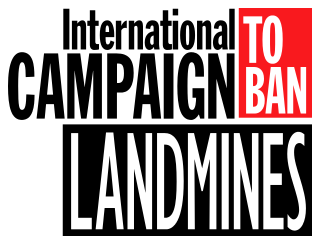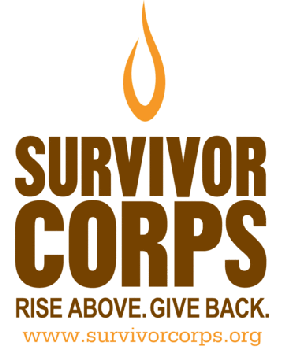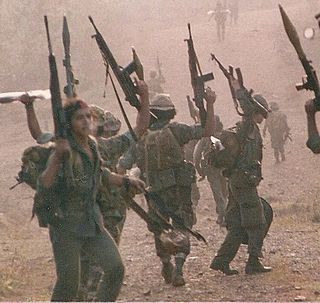Related Research Articles

A non-governmental organization (NGO) is an organization that generally is formed independent from government. They are typically nonprofit entities, and many of them are active in humanitarianism or the social sciences; they can also include clubs and associations that provide services to their members and others. NGOs can also be lobby groups for corporations, such as the World Economic Forum. NGOs are distinguished from international and intergovernmental organizations (IOs) in that the latter are more directly involved with sovereign states and their governments.

Jody Williams is an American political activist known for her work in banning anti-personnel landmines, her defense of human rights, and her efforts to promote new understandings of security in today's world. She was awarded the Nobel Peace Prize in 1997 for her work toward the banning and clearing of anti-personnel mines.

The International Campaign to Ban Landmines (ICBL) is a coalition of non-governmental organizations whose stated objective is a world free of anti-personnel mines and cluster munitions, where mine and cluster munitions survivors see their rights respected and can lead fulfilling lives.

The Convention on the Prohibition of the Use, Stockpiling, Production and Transfer of Anti-Personnel Mines and on their Destruction of 1997, known informally as the Ottawa Treaty, the Anti-Personnel Mine Ban Convention, or often simply the Mine Ban Treaty, aims at eliminating anti-personnel landmines (APLs) around the world.
Governance is the process of making and enforcing decisions within an organization or society. It is the process of interactions through the laws, social norms, power or language as structured in communication of an organized society over a social system. It is done by the government of a state, by a market, or by a network. It is the process of choosing the right course among the actors involved in a collective problem that leads to the creation, reinforcement, or reproduction of acceptable conduct and social order". In lay terms, it could be described as the processes that exist in and between formal institutions.
Human security is a paradigm for understanding global vulnerabilities whose proponents challenges the traditional notion of national security through military security by arguing that the proper referent for security should be at the human rather than national level. Human security reveals a people-centred and multi-disciplinary understanding of security which involves a number of research fields, including development studies, international relations, strategic studies, and human rights. The United Nations Development Programme's 1994 Human Development Report is considered a milestone publication in the field of human security, with its argument that ensuring "freedom from want" and "freedom from fear" for all persons is the best path to tackle the problem of global insecurity.

Survivor Corps, formerly known as the Landmine Survivors Network, was a global network of survivors helping survivors to recover from war, rebuild their communities, and break cycles of violence. The organization currently operated programs in Albania, Armenia, Azerbaijan, Bosnia-Herzegovina, Burundi, Colombia, Croatia, El Salvador, Ethiopia, Georgia, Jordan, Kosovo, Macedonia, Montenegro, Serbia, Uganda, Rwanda, the United States and Vietnam.
The Cluster Munition Coalition (CMC) is an international civil society movement, which campaigns against the use, production, stockpiling, and transfer of cluster munitions. Cluster munitions, a type of munition stockpiled by more than 80 states, are documented to have caused significant civilian deaths and injuries and have frequently caused indiscriminate effects in both conflict and peace times. Their use is prohibited under the 2008 Convention on Cluster Munitions, a convention formally endorsed on May 30, 2008, in Dublin, Ireland, and was signed by 94 countries in Oslo on December 3-4, 2008. The Convention entered into force, becoming a binding international law on August 1, 2010, after 30 countries formally ratified it. As of January 4, 2012, it had been signed by 111 countries, of which 77 have ratified.
The concepts of security sector governance and reform generally refer to a process in Western-based international development and democratization to amend the security sector of a state towards good governance and its principles, such as freedom of information and the rule of law.
A mine clearance organization, or demining organization, is an organization involved in the removal of landmines and unexploded ordnance (UXO) for military, humanitarian, or commercial reasons. Demining includes mine clearance, as well as surveying, mapping and marking of hazardous areas.

Geneva Call is a non-governmental organization based in Geneva, Switzerland. It is currently focusing its efforts on banning the use of anti-personnel mines, protecting children from the effects of armed conflict, prohibiting sexual violence in armed conflict, working towards the elimination of gender discrimination and building armed non-State actors’ knowledge and implementation of broad International Humanitarian Law (IHL) rules.

Kenneth R. Rutherford is co-founder of the Landmine Survivors Network and an American researcher in the field of political science.
The Swiss Campaign to Ban Landmines is a member of the International Campaign to Ban Landmines (ICBL). It is an umbrella organisation composed of about 50 Swiss NGOs gathered around the common objective of banning antipersonnel landmines and similar indiscriminate weapons. At the national level, the Swiss Campaign to Ban Landmines successfully advocated in favor of a national ban of antipersonnel landmines and of Switzerland’s signature and ratification of the Ottawa Treaty in 1995-1997. Within the ICBL, the Swiss Campaign was a member of the Non State Actors Working Group, which it co-chaired until the end of 2004.
Non-state describes a stakeholder or force in a debate or conflict in which sovereign states and international organizations are the major and minor parties, respectively. Non-state can refer to anything that is not affiliated with, supported by, or connected directly to a sovereign state or one of its governmental organizations, including in international commerce. Non-state may also refer to groups that are unincorporated within a particular state, or are unknown to the state or nation they are within.

In international relations, violent non-state actors (VNSAs), also known as non-state armed actors or non-state armed groups (NSAGs), are individuals or groups that are wholly or partly independent of governments and which threaten or use violence to achieve their goals.

The Geneva Conventions are international humanitarian laws consisting of four treaties and three additional protocols that establish international legal standards for humanitarian treatment in war. The singular term Geneva Convention usually denotes the agreements of 1949, negotiated in the aftermath of the Second World War (1939–1945), which updated the terms of the two 1929 treaties and added two new conventions. The Geneva Conventions extensively define the basic rights of wartime prisoners, civilians and military personnel; establish protections for the wounded and sick; and provide protections for the civilians in and around a war-zone.
A human rights group, or human rights organization, is a non-governmental organization which advocates for human rights through identification of their violation, collecting incident data, its analysis and publication, promotion of public awareness while conducting institutional advocacy, and lobbying to halt these violations. Like other NGOs, human rights groups are defined in their characteristics by legal, including taxation, constraints under which they operate, such as

The United Nations Guiding Principles on Business and Human Rights (UNGPs) is an instrument consisting of 31 principles implementing the United Nations' (UN) "Protect, Respect and Remedy" framework on the issue of human rights and transnational corporations and other business enterprises. Developed by the Special Representative of the Secretary-General (SRSG) John Ruggie, these Guiding Principles provided the first global standard for preventing and addressing the risk of adverse impacts on human rights linked to business activity, and continue to provide the internationally accepted framework for enhancing standards and practice regarding business and human rights. On June 16, 2011, the United Nations Human Rights Council unanimously endorsed the Guiding Principles for Business and Human Rights, making the framework the first corporate human rights responsibility initiative to be endorsed by the UN.
Multistakeholder governance is a practice of governance that employs bringing multiple stakeholders together to participate in dialogue, decision making, and implementation of responses to jointly perceived problems. The principle behind such a structure is that if enough input is provided by multiple types of actors involved in a question, the eventual consensual decision gains more legitimacy, and can be more effectively implemented than a traditional state-based response. While the evolution of multistakeholder governance is occurring principally at the international level, public-private partnerships (PPPs) are domestic analogues.

Casualty recording is the systematic and continuous process of documenting individual direct deaths from armed conflict or widespread violence. It aims to create a comprehensive account of all deaths within a determined scope, usually bound by time and location.
References
- ↑ "non-state actor | Definition of non-state actor in English by Oxford Dictionaries". Oxford Dictionaries | English. Archived from the original on July 6, 2018. Retrieved 2018-07-06.
- ↑ The Decentralized Autonomous Organization and Governance Issues. Regulation of Financial Institutions Journal: Social Science Research Network (SSRN). 5 December 2017.
- ↑ "QUNO | Quaker United Nations Office". www.quno.org. Retrieved 2018-01-18.
- 1 2 Rochester, Martin J. Between Two Epochs: What’s Ahead for America, the World, and Global Politics in the Twenty-First Century. Upper Saddle River, NJ: Prentice Hall, 2002.
- ↑ "The Impact of Non-State Actors on World Politics: A Challenge to Nation States". Muhittin Ataman. Retrieved 12 October 2018.
- ↑ Weller, Marc (2010-09-02). Iraq and the Use of Force in International Law. Oxford University Press. doi:10.1093/acprof:oso/9780199595303.003.0005. ISBN 978-0-19-959530-3.
- ↑ "Overview, The Cotonou Agreement". The Cotonou Agreement. European Commission. 10 May 2012. Archived from the original on 14 February 2014. Retrieved 11 June 2012.
- ↑ K. Hassine, Regularizing Property Rights in Kosovo and Elsewhere, 2010, ISBN 978-3-86553-340-1
- ↑ "Coordinating climate action: From the national to the local". Low Emission Development Strategies Global Partnership (LEDS GP) . Retrieved 15 March 2016.
- ↑ "Timeline of the international campaign to ban landmines" (PDF). The International Campaign to Ban Landmines (ICBL). Retrieved 15 January 2020.
- ↑ Cheng, Christine (2018-06-21). "Extralegal Groups in Post-Conflict Liberia". Oxford Scholarship Online. doi:10.1093/oso/9780199673346.001.0001. ISBN 978-0-19-967334-6.
- ↑ Non-state actors as standard setters. Peters, Anne, 1964-. Cambridge: Cambridge University Press. 2009. ISBN 978-0-511-63551-9. OCLC 667016755.
{{cite book}}: CS1 maint: others (link)